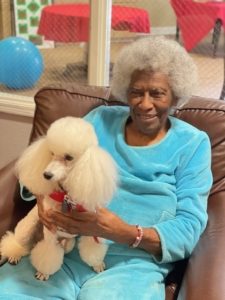FREQUENTLY ASKED QUESTIONS
What is IETD?
Inland Empire Therapy Dogs, Inc. (IETD) is a very active locally based therapy dog group which is also a tax-exempt 501(c)(3) nonprofit organization. IETD’s national parent therapy dog organization is Bright and Beautiful Therapy Dogs, Inc. (BBTD.) BBTD provides IETD’s guidelines, covers our teams with liability insurance during visits and provides our evaluation and certification testing process. IETD evaluators conduct certification testing under BBTD auspices. IETD offers our teams a large variety of visits and event opportunities at many hospitals, schools and community settings.
What is a therapy dog?
A therapy dog is a dog trained to provide affection, comfort and support to people in a wide variety of facilities and settings including: hospitals, assisted living facilities, nursing homes, schools, libraries and at community events.
What is the difference between a therapy dog, service dog and emotional support dogs?
Some people think that a therapy dog is the same as a service or emotional support dog. It’s important for trainees to know that this is not the case.
- Therapy dog – Therapy dogs are considered pets in the eyes of the law. Therapy dogs and their owners have no special travel, housing or public access rights. Therapy dogs are animals that volunteer with their owners to improve the lives of others.
- Service dog – A service or assistance dog is an animal specifically trained to aid or assist an individual with a disability and are to be focused solely on that one person.
- Emotional support dog – Emotional support animals (ESAs) refer to dogs and other pets that provide emotional support and comfort to their owners daily. ESAs legally must be prescribed by a licensed mental health professional like a therapist, psychologist, or psychiatrist.
Click Here to see a chart that summarizes the differences.
Do you train service or emotional support dogs?
No. We do not train service animals or emotional support animals.
Do you provide trained therapy dogs for people?
No. A handler owns their dog and together they train with us to become a certified therapy dog team.
What makes a good therapy dog?
A well-mannered, friendly dog who enjoys meeting people, gets along with other dogs and going into new places is what is needed in a therapy dog. Remember though that it is not just your dog, you are an integral part of the team bringing joy to others.
Does a therapy dog need to be a certain breed?
No. Any dog is eligible to be a Therapy Dog – mixed breeds, rescues, retired show dogs and obedience dogs have all made fine therapy dogs. We are non-breed discriminatory.
What is asked of me?
We ask handlers to come to us with a sincere and realistic goal to volunteer with their dog to bring comfort and joy to people in a variety of settings. IETD mandates a minimum of one-hour visitation per month.
What are the requirements to start training?
We highly recommend that dogs have completed their AKC Canine Good Citizen™ (CGC) training and have their title. The CGC shows that dogs have mastered the basics of good manners and obedience.
What training do you provide?
We will help you and your dog learn how to respond to unfamiliar sights and sounds such as: medical equipment (which may include wheelchairs, crutches and walkers,) loud noises and crowds. Also, the appropriate way to approach patients in hospital beds, wheelchairs, and walkers during visits. We will help with skills needed to work with and around other therapy dogs.
What costs are there?
We do not charge for training.
- Our evaluators provide BBTD therapy dog certification when you and your dog are ready. IETD does not add a charge for their evaluation/certification testing services.
- At the time of certification, we ask that you join Inland Empire Therapy Dogs. The cost to join IETD is $40 per year, pro-rated quarterly starting in May.
- The cost to start your BBTD membership is $50.00.
What are Bright and Beautiful Therapy Dogs, Inc. Guidelines?
Click here for BBTD Guidelines
I have a new dog that I want to be a therapy dog someday. What kind of training should I be doing right now?
Start by spending lots of time socializing your dog. Take them everywhere dogs are allowed to go. Introduce them to people of all ages-from little children to the elderly. Expose them to lots of different noises-cars, sirens, train whistles, etc. Start taking your dog to behavior training classes right away. Doing so builds a strong bond between you and your dog as you train together as a team. Plan play dates so your dog gets used to being around other dogs.




